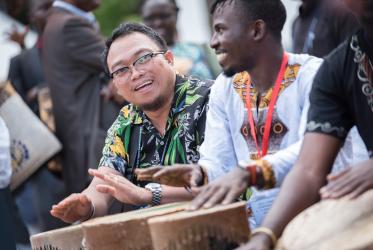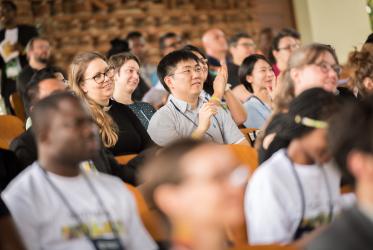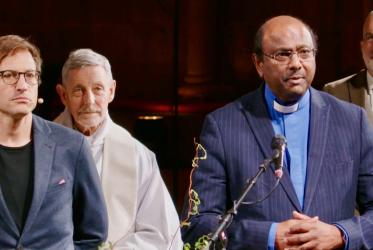Marking an important milestone in the history of the World Council of Churches (WCC) Ecumenical Institute at Château de Bossey, the first candidate of the institute’s doctoral programme successfully completed his research with a viva voce examination at the University of Geneva on 24 May.
The programme leading to the conferment of the title of a doctor in theology (special mention ecumenism) is carried out in collaboration with the Autonomous Faculty of Protestant Theology of the University of Geneva. The occasion underlines the efforts of the Ecumenical Institute to contribute to the development of theological leadership capacities in WCC member churches worldwide.
The candidate, Rev. Daniel Y. Mbaya, who is general secretary of the Church of the Brethren in Nigeria (EYN) defended a thesis on the witness of nonviolence of the Church of the Brethren in Nigeria, and the process towards ecumenical collaboration.
Focusing on the life and witness of the Church of the Brethren in Nigeria as a historic peace church in confrontation with rampant and extremist violence, particularly in the northern part of the country, Mbaya’s research contributes to building knowledge in one of the most challenging contemporary ethical fields.
Mbaya shows how the church has remained faithful to its tenet of nonviolence despite a societal environment with increasingly high levels of violence, also from terrorist groups. The Church of the Brethren in Nigeria contributes to the development of a climate in which churches support each other in their commitment to re-establish peace, as he underscores in his thesis: ”In developing an ethics and culture of peace and nonviolence, it should not be the responsibility of a single denomination…It should be the collective responsibility of the entire body of Christ in the Nigerian context…”
Amélé Ekué, professor of Ecumenical Social Ethics at the Ecumenical Institute, who supervised the research together with Prof. Ghislain Waterlot of the University of Geneva, stresses that Mbaya’s work is not only an individual achievement, but one that “will stand him in good stead as he seeks to encourage and prepare the next generation of leaders from his church for ecumenical and interreligious collaboration.”
“This doctorate is at the same time a multiplier for the ecumenical vision and the message of peace as lived and witnessed by a church under recurrent assault,” Ekué adds.
In the next three weeks, the viva examinations of two other Bossey candidates will take place, with students from India and Rwanda respectively.
The Ecumenical Institute, academically attached to the University of Geneva, through which all its study programmes are accredited, is committed to ecumenical formation in its broadest expression. Every year the institute welcomes students from all parts of the world, who engage with key themes of the ecumenical movement as part of four academic study programmes. At the same time the World Council of Churches offers through its Ecumenical Theological Education and Ecumenical Continuing Formation programmes a series of short-term courses and inter-regional consultation processes on cutting-edge issues of the ecumenical fellowship.
WCC work on Ecumenical Theological Education








